A VILE VILLON MAKES FOR VILLAINOUS VIEWING
Art isn’t pretty – and neither is Murray Mednick’s sharp, cynical comedy about the life of the great artistic poet François Villon, who, in 15th century France, wrote some of history’s great romantic poetry, all the while living the life of a boozing, whoring, murderous scoundrel.
In the production’s program, author Mednick, founder of the Padua Hills Playwrights Workshop/Festival, and a legend in the Los Angeles theater scene, explains that his play is not meant to be a biography of Villon, who rose from peasant to being one of the great love poets of his era, and then vanished under the most mysterious of circumstances.
Instead, the work’s philosophical meditation on the nature of theater’s artifice utilizes the character of Villon as its central cornice while playing tricks on the audience in terms of time, place, and perception. Yes, we are treated to portions of Villon’s life story – but the writing then acrobatically swerves in other directions, to a discussion of artists as criminals, perhaps, or to a long digression in which a woman empties her bladder into a chamber pot before throwing the contents on her landlord’s head.
Opening with a brief description of his early years, Villon (a delightfully weaselly looking Kevin Weisman) escapes the squalor of his peasant family’s home when he’s adopted by an itinerant professor (Gray Palmer), who teaches the boy all he knows and then dies, at which point the boy takes the older man’s name. Villon forms a band of ne’er do well actors and they travel France performing plays; that is, when they aren’t hiding out in the dark forests, on the lam from the law. Eventually Villon is arrested and the King himself (Carl J. Johnson) offers him a choice: vanish into obscurity or be executed.
But the facts of Villon’s life are ultimately secondary to the calculatedly off-kilter narrative style with which Mednick presents his play, a style that’s challenging at best, downright maddening at worst. He offers the work as a meditation on the lying, fallacious nature of theater itself. His characters gleefully admit that they’re not the historical people they’re portraying, but are scammers playing games (which, really, isn’t that what actors are anyway?). They focus on elements and ideas that have nothing to do with the plot, instead joking about how the surreal nature of the stage allows them to travel through time and space.
The basic theme of the piece is that true artists are subverts, perverts, and inverts, that the very nature of artistic creation is akin to the act of breaking the law. This is a remarkably appealing conceit, though perhaps a bit self-serving, if you happen to imagine that you are just that kind of an aesthetic outlaw. Yet, there’s some pleasure to the moments in which a character cheerfully gets out of a situation by simply noting “It’s now several hours later!” or “It’s now the next day!” – and the stage manager obediently changes the time for them.
In Mednick’s crisp, but at times distancing staging, the performers whiz through the dialogue at a breakneck speed that makes it quite difficult to follow the admittedly already quite disparate plotting’s perturbations. This may indeed be part of Mednick’s purpose, as the work often seems intentionally – no, spitefully – oblique. It’s as though the cast is having a great time, japing and performing their mischief, and, in their dirty, rag-like costumes (credited to Adriana Lambarri), everyone looks like they’re wildlings right out of Game of Thrones. However, it is only intermittently that any sense of fun transfers to the audience, who are sometimes left feeling a more than a bit out of it.
Yes, ambiguity is a lovely quality in a play – but Mednick’s work is less ambiguous than it is rather gleefully, twistedly confusing, almost in a spiteful way. This is a play that is put on by pirates about scoundrels – but the undercurrents of playful malice don’t make up for the fact that the work is comprehensible mainly to the performers, not to the increasingly mystified audience.
At the same time, we can’t help but feel that the work’s clever archness comes at the cost of what Mednick would probably rather disdainfully call “the human dimension.” Although the dialogue crackles with quirky, non sequitur jokes and snarky repartee, there’s little strong characterization. And the characters don’t actually do anything.
Occasionally, we get the sense that some of these folks are intended to be archetypes: Palmer’s sad-faced, weak old mentor is one; while Peggy Ann Blow, in a standout turn as Villon’s hunchbacked, ever-smiling hag of a best friend, is another. However, none of the facets really add up to a coherent set of characters or story. Even a straightforward biography of Villon would probably be more appealing than the confusion we’re actually served.
That said, Weisman’s nasty little runt of an amoral protagonist is wonderfully clownish. With a wicked leer and narrowed eye, he’s every bit the dangerous artist and lothario — but, every once in a while, the lizard-like carapace cracks slightly to reveal the heart of the poetic romantic within.
Villon
Padua Playwrights
a guest production at the Odyssey Theatre
2055 S. Sepulveda Blvd.
scheduled to end on March 23, 2014
for tickets, call (310) 477-2055 x 2
or visit www.PaduaPlaywrights.org
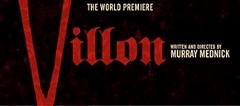
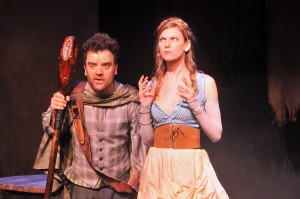
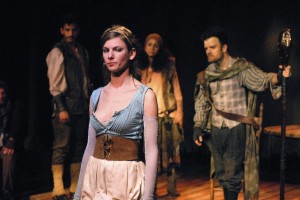

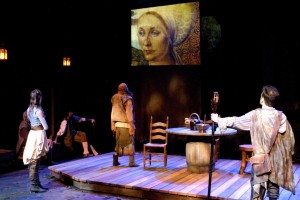
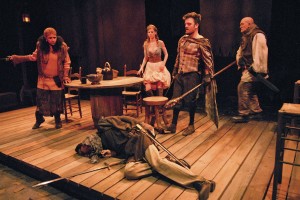
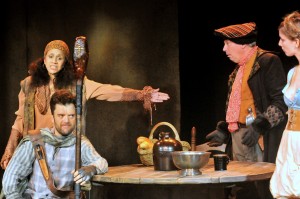
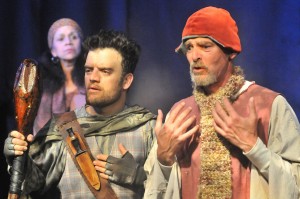
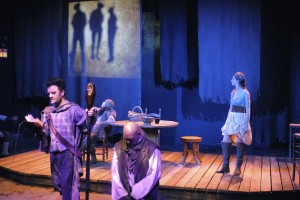
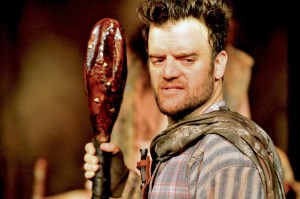
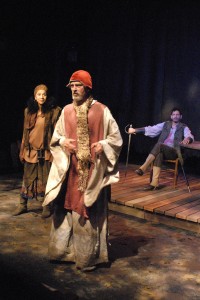

{ 4 comments… read them below or add one }
Greetings–
Would be grateful if you could forward to Gray Palmer: Did you once play Petruchio in Westport? Great to see you as the professor–you should come play in the summer ‘Will Power’ Shakespeare festival in Albuquerque.
Cheers,
Mg
Marsala? Sister of Magos? I’m on Facebook. Or send email. Gray
Dear Gray Palmer:
In my last year at Julliard (1976) this guy named GRAY PALMER popped up in the drama division. (He wasn’t in my group. I think he was in Diana Venora’s group.) Anyway, I saw him act in a couple Shakespeare’s, and I’m wondering if YOU are that Gray Palmer? Because if indeed you ARE, you are also one of the greatest actors who has ever walked the planet! Your acting was always something of a revelation, Gray. You deliver iambic pentameter as if you’re literally making it all up at the moment of speaking. God Bless You, Man!
Good God, Wendell! Yes, that was me at Juilliard. Thanks for the kind words about acting. (You were terrific in one of my favorite Soderbergh movies.) I’m on FB. All best to you, Brother!